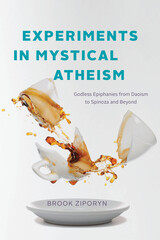

Western philosophy is stuck in an irresolvable conflict between two approaches to the spiritual malaise of our times: either we need more God (the “turn to religion”) or less religion (the New Atheism). In this book, Brook Ziporyn proposes an alternative that avoids both totalizing theomania and meaningless empiricism. What we need, he argues, is a deeper, more thoroughgoing, even religious rejection of God: an affirmative atheism without either a Creator to provide meaning or finite creatures in need of it—a mystical atheism.
In the legacies of Daoism and Buddhism as well as Spinoza, Nietzsche, and Bataille, Ziporyn discovers a critique of theism that develops into a new, positive sensibility—at once deeply atheist and richly religious. Experiments in Mystical Atheism argues that these “godless epiphanies” hold the key to renewing philosophy today.

Lineages Embedded in Temple Networks explores the key role played by elite Daoists in social and cultural life in Ming China, notably by mediating between local networks—biological lineages, territorial communities, temples, and festivals—and the state. They did this through their organization in clerical lineages—their own empire-wide networks for channeling knowledge, patronage, and resources—and by controlling central temples that were nodes of local social structures.
In this book, the only comprehensive social history of local Daoism during the Ming largely based on literary sources and fieldwork, Richard G. Wang delineates the interface between local organizations (such as lineages and temple networks) and central state institutions. The first part provides the framework for viewing Daoism as a social institution in regard to both its religious lineages and its service to the state in the bureaucratic apparatus to implement state orthodoxy. The second part follows four cases to reveal the connections between clerical lineages and local networks. Wang illustrates how Daoism claimed a universal ideology and civilizing force that mediated between local organizations and central state institutions, which in turn brought meaning and legitimacy to both local society and the state.

The question of truth has never been more urgent than today, when the distortion of facts and the imposition of pseudo-realities in the service of the powerful have become the order of the day. In The Paradox of Being Poul Andersen addresses the concept of truth in Chinese Daoist philosophy and ritual. His approach is unapologetically universalist, and the book may be read as a call for a new way of studying Chinese culture, one that does not shy away from approaching “the other” in terms of an engagement with “our own” philosophical heritage.
The basic Chinese word for truth is zhen, which means both true and real, and it bypasses the separation of the two ideas insisted on in much of the Western philosophical tradition. Through wide-ranging research into Daoist ritual, both in history and as it survives in the present day, Andersen shows that the concept of true reality that informs this tradition posits being as a paradox anchored in the inexistent Way (Dao). The preferred way of life suggested by this insight consists in seeking to be an exception to ordinary norms and rules of behavior which nonetheless engages what is common to us all.
READERS
Browse our collection.
PUBLISHERS
See BiblioVault's publisher services.
STUDENT SERVICES
Files for college accessibility offices.
UChicago Accessibility Resources
home | accessibility | search | about | contact us
BiblioVault ® 2001 - 2024
The University of Chicago Press









